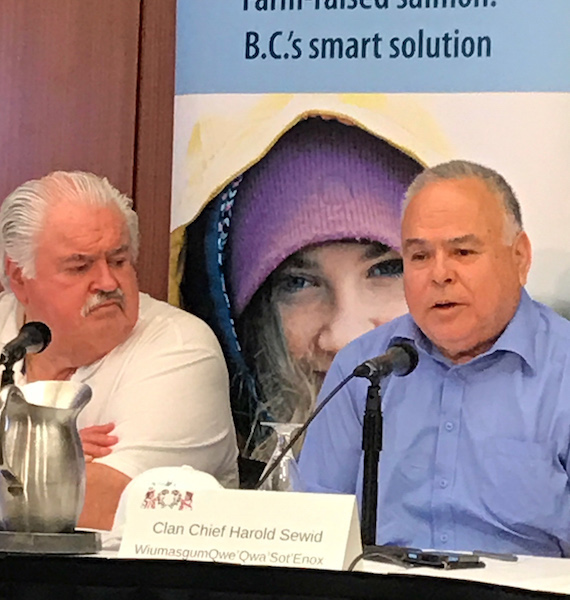B.C. First Nations tell eco-militants to stay away
Coastal First Nations leaders, salmon farm workers tell Sea Shepherd Conservation Society to stay off their traditional territories and aquaculture farms
By Fabian Dawson
SeaWestNews
Fed up with the barrage of lies about their salmon farming operations, First Nations leaders gathered in Vancouver today to send a message to foreign eco-militants and their local supporters – stay away.
Speaking about the importance of salmon farming, the First Nations leaders took particular aim at the foreign activists with the Sea Shepherd Conservation Society, which has harassed salmon farms for the last two summers.
The group is planning another campaign of harassment at BC salmon farms this summer, while
foreign funding is helping a local anti-salmon farming group to spread mistruths about the industry.
“I sent a letter to the Sea Shepherd Society last year asking them not to come to our traditional territory, and their response was that under marine law they can come anywhere they want,” said Tlowitsis Chief John Smith. (pictured on the left)
“Then, they came and harassed our partner’s employees in their workplaces. I have a message for them. Stay away from our territory, and our partners’ farms. You are not invited here.”
Chief Smith added salmon farming has become an important economic driver for his members, creating jobs and economic activity allowing them to purchase land for their community and establish a post-secondary education scholarship fund for their youth.
Harold Sewid (pictured on the right), Clan Chief of the Broughton-based WiumasgumQwe’Qwa’Sot’Enox, aquaculture industry service provider, and commercial herring & salmon fisherman, added he was initially hesitant about salmon farming when he first looked at it 20 years ago.
His concerns were put to rest when he saw how responsible the industry was, and how willing it was to collaborate with his community.
“As a chief, I have a responsibility to care for our land and waters and all the animals here,” Sewid said. “For the last 20 years, I have seen B.C.’s salmon farmers address any issues that have come up. They have taken care of our environment while providing our people with good jobs.”
James Walkus owns a business based in Port Hardy that transports fish from Marine Harvest farms. Also a commercial fisher, he operates five vessels and employs up to 30 people at a time. He currently has a new boat intended to harvest farm-raised salmon in the Broughton under construction in North Vancouver.
“Aquaculture needs to continue,” Walkus said. “The employment it creates for many of our First Nations and other Canadians is important. In Klemtu, it is the major employer.
We need it, British Columbia needs it, the world needs it. If we don’t do it some other country will and it will be our loss and some other country’s gain.”
Maurice Isaac, a member of the Tlowitsis First Nation, has worked in salmon farming for 18 years. He started as a farm technician and has worked his way up to managing a Marine Harvest farm site.
“As one of many First Nations people working in the industry I want people to know it’s not as activists are portraying it,” Isaac said. “Come visit our farm, and you will see healthy fish and modern technology. I feel I do my part in keeping wild salmon stocks alive by growing Atlantic salmon. Without this there would be no wild salmon left, in my opinion.”
He added he’s seen great change in his time in salmon farming.
“Nothing is ever taken lightly out here. When it comes to the environment we do everything we can to protect it, preserve it. The activists are misinformed.”
Salmon farming supports about 6,600 direct and indirect jobs in B.C. About 20 per cent of people directly employed by the industry are of First Nations heritage. B.C.’s salmon farmers have agreements with 20 First Nations, and 78 per cent of salmon raised on farms in B.C. is done so in partnership with First Nations.
On average, about 70 per cent of the salmon harvested in B.C. each year is farm-raised. Globally, more than half the fish humans consume is farm-raised. The UN recently projected that will grow to two-thirds by 2030 as human populations and demand for health fish to eat grows.
Farm-raised salmon is B.C.’s highest valued seafood product, the province’s top agricultural export, and generates over $1.5-billion towards the B.C. economy, resulting in over 6,600 jobs.
RELATED LINKS
A livelihood threatened by well-funded “bullying”
Salmon virus study is about activism not science: experts
Aquaculture industry supports talks to address UNDRIP issues in BC

